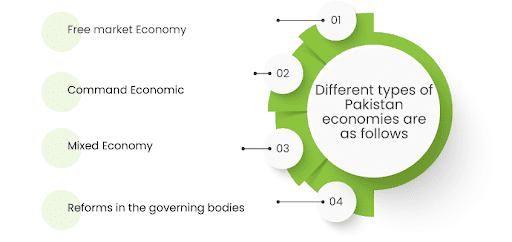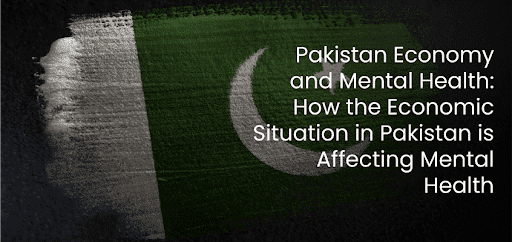Introduction
Pakistan is a democratic country with a central government and other governing bodies. In the past century, Pakistan has undergone numerous reforms in Gross Domestic Product (G.D.P.), economy, governing bodies, and policies, both an initial rise in growth rate and eventual downfall. But what has plagued Pakistan is its health care system for the general public. Physical and mental health issues have risen substantially in the last few decades. This article will focus on mental health issues in the people of Pakistan and how their economic crisis has led to a rise in individuals with mental health issues.
Our Wellness Programs
What is the Pakistan Economy and Mental Health

Different types of Pakistan economies are as follows:
- Free market Economy: In this type of economy, the capitalist, businesses, firms, and individuals can make their own decisions regarding the production, supply, and growth of their wealth. It is usually seen in democratic countries.
- Command Economic: Here, a central governing body makes policies and decisions regarding the people’s economic growth.
- Mixed Economy: A mixed economy is a blend of free and commands Economy characteristics. It is the most common type of economy seen around the world. Pakistan has a diverse economy at present.
In the 20th century, Pakistan had a free market economy in place. The government enjoyed a double tenure, and Pakistan saw substantial growth in its G.D.P. and growth rate. But, in the middle of the century, a Command Economy took over for a decade. It caused many reforms in the governing bodies, and the general public had to bear its brunt. Eventually, a mixed economy grew, benefiting the government and the public.
The major sectors in Pakistan’s economy are agriculture, industries, and services. The agricultural sector contributes to one of the significant portions of Pakistan’s G.D.P. at 21%, with most of the population working in crop fields and production. Industries form 21%, whereas services contribute 58% of the G.D.P.
Economy and mental health relate to each other. The mental health of people depends on their economic condition. Due to the problems of financial situation, people face insecurity which causes anxiety, depression, and many other mental issues.
Looking for services related to this subject? Get in touch with these experts today!!
Experts

Mansi Chawla

India
Psychologist
Experience: 12 years

Sapna Zarwal

India
Psychologist
Experience: 19 years

Davis Emerson

India
Psychologist
Experience: 6 years
Why did the Pakistan economy collapse? Let’s dig deep.
Pakistan has been importing essential items and exporting non-essential items, which have proven to be the most crucial cause of the downfall of Pakistan’s economy. Pakistan has rich resources of minerals, crops, and grains that must get priority for significant exports. The agriculture sector of Pakistan is looming in the dark with inconsistent natural calamities, droughts, reduced groundwater, and pollution.
Pakistan’s rupee has fallen considerably against the U.S. dollar, making repayment of existing debts difficult. Pakistan is taking new loans from I.M.F. and Saudi Arabia to clear its older loans, thereby falling into the debt trap and becoming vulnerable to economic collapse. Rising oil and crude prices have made things critical for the people of Pakistan. People who survive on limited food resources do not have sufficient money for daily needs.
What is the relationship between Pakistan’s Economy and Mental Health
Mental health is a crucial factor in the growth of a population.
- The people of Pakistan are vulnerable to mental health issues due to their falling economy. Pakistan’s most common mental health disorders are anxiety, depression, psychosis, schizophrenia, and suicidal tendencies.
- According to researchers, food insecurity, lack of resources, rising debts, and natural calamities directly correlate to increasing mental health issues among the people of Pakistan.
- Pakistan is self-sufficient in food due to its agriculture sector. Still, a rise in natural calamities led to the loss of finances, properties, and high-interest rates on loans. It led to slowly mounting anxiety among the households and an exponential increase in the suicide rate.
- The government of Pakistan cannot satisfy the needs of its people, which has led to economic frustration and mental health issues in Pakistan.
According to psychiatrists in Pakistan, most mental health issues go undiagnosed and untreated due to a lack of resources and funds to get help. Even when they begin treatment, the inability to pay for medical expenses increases the number of dropouts. This further increases the burden on the health sector.
How to overcome problems that arise from Pakistan’s Economy and Mental Health
Can Pakistan bounce back with her G.D.P.?
The strength of a country is its people and health, which will significantly contribute to economic growth and G.D.P. Pakistan has been trying to get rid of existing loans with the help of new loans, but this is pushing them deep into the death trap. Economic experts suggest that Pakistan improve its agriculture sector to form more than 50% of its G.D.P. Exports should primarily concentrate on on-demand essential items rather than non-essential items.
Overcome mental health issues
Pakistan has been working on improving the mental health of their people through programs, educational videos, an improved health care system in rural areas, etc. But, the government must put more effort into improving food security, resources, and industrial growth.
Conclusion
Pakistan is a democratic country with a mixed type of economy. The major sectors in its economy are agriculture, industries, and services. Services form the motor portion of its G.D.P., followed by industries and agriculture. In recent years, Pakistan has fallen prey to a debt trap due to the falling economy, the uncertain government, and the failure to implement policies that will contribute to its growth. The economic crisis has given rise to mental health issues due to food insecurity, lack of resources, and increasing financial burden. As Pakistan’s agricultural and industrial sectors start reviving, its citizens’ mental health issues will be under significant control.


















